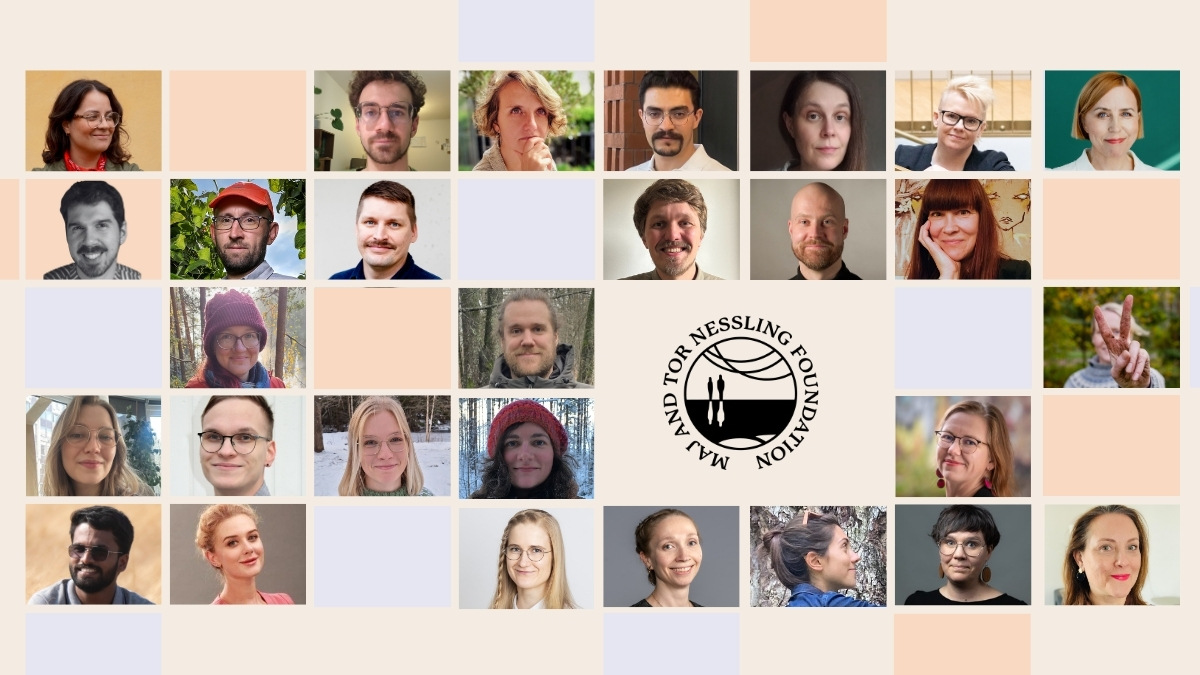The Nessling Foundation’s general grant call received a record 586 applications this year. From these, 29 projects that aim to speed up the sustainability transformation and bring human activity back within the planetary boundaries were selected for funding. The funded projects address themes such as critical perspectives on technology, preparedness for risks arising from the ecological crisis, and the transformation of agriculture and forestry. The transformative potential of changes in human behaviour and culture will also be examined in more detail through the funded projects.
The overarching theme of the Nessling Foundation’s general call is sustainability transformation. The themes that stand out among this year’s funded projects shed light on how the research community is currently approaching solutions to the sustainability transformation.
By sustainability transformation we mean a comprehensive process of societal change grounded in strong sustainability, which aims to align human activities with the ecological limits of the planet. It demands a far-reaching transformation that extends beyond people’s values and attitudes across all areas of life: to the structures and functions of culture and society such as the economy, governance, production and consumption.
Altogether, 29 projects were selected for funding: 12 doctoral thesis projects, 10 postdoc projects and 7 science-based action projects. Taken together, the projects address the challenges of the sustainability transformation from a wide range of perspectives.
The Nessling Foundation’s Science and Executive Director Iina Koskinen finds the collection of funded projects inspiring.
“The response from the research community to our call was, as expected, diverse and multidisciplinary. The record number of applications showed that researchers and other actors are ready to challenge the fundamental assumptions of our society and to seek transformation potential in many different sectors”, Koskinen says.
“The sustainability transformation requires solutions, but also profound understanding of the phenomena, impacts and root causes that create and sustain unsustainable systems. That is why we also fund critically important basic research, which builds the knowledge base and societal foundations on which just solutions can emerge”, Koskinen continues.
Below is a more detailed presentation of some of the funded projects, grouped under the themes that emerged from the whole.
The good and the bad of technology
We pin many hopes on technology, but its role in the sustainability transformation also needs to be called into question. Among the funded projects are perspectives that, on the one hand, criticise and challenge prevailing understandings of technology and, on the other, explore how the sustainable use of technology can be harnessed as a driver of the sustainability transformation. The projects also highlight the vast, yet largely invisible, environmental burden of the digital environment.
Examples of projects within the theme:
- Riina Bhatia: Towards an economy within planetary boundaries? The role and nature of innovations and technologies in post-growth transformations (doctoral thesis project)
- Johanna Ahola-Launonen: Technology Myth Busters – A Research-Based Media Project on Constructive and Harmful Techno-Optimism in Sustainability Transitions (action project)
- Antti Kurko: Assemblages of Digital Waste in a Broken World (doctoral thesis project)
- Minna Vigren: Sustainable Digital Everyday Life (action project)
Strengthening the resilience of societies and natural systems
On our way towards a sustainability transformation, we need a deeper understanding of the risks posed by the ecological crisis and of how we can strengthen the resilience of both societies and natural systems. The funded projects under this theme range from Finnish farmland to crisis-stricken areas of the Mediterranean, and all the way to the Atlantic’s AMOC ocean current.
Examples of projects within the theme:
- Kateryna Yuhai: Risk Management under Climate Uncertainty: Adaptive Strategies for Floods and Droughts in Finnish Crop Cultivation (doctoral thesis project)
- Suvi Silfvenius: Structural sufficiency as an instrument for environmental, social and geopolitical resilience in Finland (doctoral thesis project)
- Samuli Lähteenaho: Climate collapse: Crisis, coloniality, and environmental action in Lebanon (postdoc project)
- Helmi Räisänen: The Turning Tide: Foresight on Climate Tipping Points and Finland’s Future (postdoc project)
Multidisciplinary approaches to the transformation of agriculture and forestry
In Finland, discussion about the sustainability transformation often centres on the challenges facing agriculture and forestry. The transformation in these sectors is now being approached from multiple angles: in addition to technical and natural sciences, solutions are being sought through other disciplines. Among the funded projects are, for example, a documentary film that explores our relationship with forests through freshwater pearl mussels, a research project shedding light on the history of forest use, and a study aimed at increasing biodiversity awareness in global timber trade.
Examples of projects within the theme:
- Virpi Suutari: Lonesome Land is a feature-length documentary film about freshwater pearl mussels, humans, and the interconnectedness of living systems (action project)
- Sampo Taipale: Gaze to the ground – A.K Cajander and the forest type theory (doctoral thesis project)
- Alizee Ville: Calling trees by their name: enhancing biodiversity literacy in global timber trade (postdoc project)
- Peyman Gholami, Biodegradable Lignin-Based Fertilizers for Efficient Nutrient Delivery in Nordic Soils (postdoc project)
Changes in human behaviour
The sustainability transformation is not just a set of technical solutions; it is deeply intertwined with our society and all its dimensions – with culture, values and people’s everyday behaviour. The funded projects delve into the transformation potential in different areas of daily life, such as meat consumption, clothing and transportation.
Examples of projects within the theme:
- Esa-Pekka Nykänen: Reducing Meat Consumption Through Publicly Accepted Measures: Policy Recommendations to Support Environmental Targets (postdoc project)
- Elina Määttänen: Closing Wardrobes’ Outflow: Redesigning a Post-Anxiety Wardrobe Relationship (doctoral thesis project)
- Felix Hallikainen: Mobility Lifestyles and Promotion of Sustainable Mobility in Car-Dependent Societies (doctoral thesis project)
Nessling Foundation’s Iina Koskinen is looking forward with pride and excitement to the launch of the projects.
“The overall portfolio of funded projects is truly diverse and forcing them into a single mould would not do justice to each unique plan. At the Nessling Foundation, we do not leave researchers alone with demanding research work and the task of communicating it but instead, we offer support and sparring throughout the different stages of their projects”, Koskinen says.

All 2025 grantees in the general call
Doctoral thesis projects:
- Riina Bhatia
- Némo Fontanie
- Felix Hallikainen
- Attila Králl
- Antti Kurko
- Helmi Lehikoinen
- Elina Määttänen
- Suvi Silfvenius
- Sampo Taipale
- Tiia Tuomisto
- Jithin Vijayan
- Kateryna Yuhai
- Nadezhda Filimonova
- Peyman Gholami
- Mari Keski-Korsu
Postdoc projects:
- Nadezhda Filimonova
- Peyman Gholami
- Mari Keski-Korsu
- Samuli Lähteenaho
- Esa-Pekka Nykänen
- Andreas Otterbeck
- Eva-Maria Roth
- Helmi Räisänen
- Mariana Verdonen
- Alizee Ville
Science-based action projects:
- Johanna Ahola-Launonen and working group
- Virpi Suutari (Euphoria Film Oy)
- Noora Pyyry (University of Helsinki)
- Jalotus ry
- Finnish Youth Research Society (Nuorisotutkimusseura ry)
- Minna Vigren (LUT University)
- Finnish Museums Association (Suomen museoliitto)
More detailed descriptions of the projects can be found here.
The Nessling Foundation’s other funding calls – results of the Murros-call are published on 3 December
In addition to the general funding call, the Nessling Foundation will award funding through two other calls in 2025. The results of the Murros-call, which focuses on breaking away from structural overconsumption, will be published on 3 December. The projects selected under the Small Funding, which is intended to support civil society activities, will also be announced later in the year.

